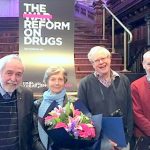On Legalising and Regulating Cocaine: An Interview With Dr Julian Buchanan

The NSW police drug detection dog program has been widely criticised, as it gets it wrong between two-thirds to three-quarters of the time. And the 2006 Ombudsman report pointed out that when searches are successful, most only turn up small amounts of cannabis.
In 2013, a passenger disembarking at Sydney’s Redfern Station was six and a half times more likely to be searched than at Central, the next stop along. The difference being that Redfern has larger populations of Aboriginal people, the less affluent, and the young, than found around Central.
One could put this down to the bias in the policing system, but on a broader scale, it reflects the prejudice inherent in the war on drugs. While wealthier people might be in possession of illicit drugs as they drive by Redfern station in their cars, it’s the poor getting off the trains being searched.
Biased drug war tactics
Criticism has also been levelled against roadside drug testing in this state. Instead of testing drivers for impaired ability, officers are testing for the mere presence of drugs. And the courts have found that this has led to individuals being charged with drug driving who weren’t under the influence.
Despite Sydney being the cocaine capital of Australia, and parts of NSW being the only areas in the country where coke rivals methamphetamine use, police in this state didn’t start testing drivers for cocaine until last July. The roadside program has been operating since 2007.
Prior to the change, police were only testing for three substances: MDMA, amphetamines and THC, the psychoactive content in cannabis. NSW Greens MLC David Shoebridge had long pointed out that the program was targeting the poor, as data shows these drugs are more likely to be used by them.
After NSW authorities finally broadened testing to include cocaine, Shoebridge explained that he hoped this would bring about reform, as the wealthy and influential might now fall short of the unfair system and push for a more reasonable, impairment-based testing regime.
Ending prohibition
Transform Drug Policy Foundation senior analyst Steve Rolles is writing a guide on legalising and regulating cocaine, along with others stimulants, like MDMA and amphetamines. This would lead to safer substances being available and bring an end to heavy-handed punitive practices policing them.
Rolles previously wrote a guide to regulating cannabis, which informed both the Uruguayan and Canadian regulated cannabis markets. When that was first published, those legal markets were far-off, so with this coming book, who knows which jurisdiction will be first to legalise stimulants.
Dr Julian Buchanan is a retired Victoria University of Wellington criminology associate professor. He welcomes the stimulant regulation guide. However, he warns that simply legalising one type of drug, whilst others remain illegal, would leave prejudiced drug law enforcement practices to continue.
Sydney Criminal Lawyers spoke to Dr Buchanan about why legalising only certain drugs will continue to penalise poor and marginalised groups, the benefits that legalising a drug like cocaine would bring about and how it’s high time to bring an end to the discriminatory drug prohibition system.
Firstly, the UK’s Transform Drug Policy Foundation is producing the world’s first guide to regulating cocaine, as well as other stimulants. Dr Buchanan, what do you think about this development?
To end prohibition and replace it with an evidence-based approach that restores human rights, we’ll need as many building blocks as possible, so I welcome the book. But, we need models of regulation not just for drugs popular among the white and privileged populations, but for all drugs.
Prohibition is a shameful, brutal and barbaric system pushed by the UN in 1961. Some argue it’s out of date, but it was never fit for purpose in the first place.
Back in the 1960s, prejudicial laws were not just directed towards the drug user. Anglophile governments had a whole raft of discriminatory laws.
There were laws to deny women from full societal participation, to remove Indigenous children from their parents, to incarcerate and “treat” people for homosexuality and to restrict the movement and opportunities of black people. There were many more prejudicial policies concerning learning disabilities and mental health.
However, 60 years later, activists have made great progress to rescind these draconian laws. But, shockingly, apart from some recent concessions to cannabis, little has changed in respect of the discriminatory and unscientific system of drug prohibition.
So, we have serious work to do to end to this archaic regime.
Prohibition created a bifurcation of drugs: promoting and privileging the use of state-approved psychoactive drugs on one hand, while peddling propaganda and misinformation about state-banned psychoactive substances.
This stark separation was not based on any rational assessment of risk or harm. And it had no science to support it. It was built on discrimination and prejudice to retain privilege for those individuals and businesses involved in state-approved drug use, such as pharmaceuticals, caffeine, nicotine, sugar and alcohol.
So, importantly, before we begin regulating any drug, we should do everything we can to expose, challenge and dismantle this shameful system of prohibition, rather than modify it.
You’re saying that prohibition needs to end prior to the task of regulating currently illicit substances. Why would you say that is?
Seeking to regulate particular drugs on a case-by-case assessment of risk within the paradigm of prohibition, which has arbitrarily demonised some psychoactive drug use and promoted other more harmful psychoactive drug use, only consolidates and gives legitimacy to an unscientific and untenable system.
Unless we expose and challenge the system of prohibition, new models of regulation will be shaped by the corrupt and deeply flawed prohibitionist paradigm.
The process of pleading the case with the public and politicians for each banned drug or set of drugs – as will be outlined in the book – to be regulated, would be needlessly tedious and exhausting.
Although, more worryingly, I suspect comprehensive drug regulation would never happen, as once the most popular drugs are legally regulated, reform interest to regulate less popular drugs used by the “Other” is likely to wane.
So, at some point, we’ll be left with a reformed system of prohibition, that includes an expanded number of state-approved drugs enjoying the legal and social privileges currently afforded to alcohol.
Without the sweeping cultural changes and restoration of human rights achieved by ending drug prohibition, the model of drug regulation adopted, risks incorporating the distasteful values of prohibition that have disproportionately targeted the poor, Indigenous populations, and people of colour.
Without transformational reform, drug law enforcement would continue as before with a new role to arrest for unregulated possession, production and/or cultivation of unapproved drugs for personal use. I’d call this Prohibition 2.0.
In the past, you’ve touched on how prohibition impacts different societal groups disproportionately. And indeed, you’ve pointed out that a regulated drug market if not established in the correct manner could replicate disadvantages present in the current system.
How do you envisage the system you’re describing now would affect the different classes?
To the privileged class, prohibition is a flawed policy worthy of fixing and improving. The privileged use banned drugs at similar rates to other groups, but rarely have they ever been targeted by drug law enforcement measures.
While criminalisation poses a hypothetical risk, the greatest concern to the privileged class is ensuring a clean legitimate supply so they know what they’re taking and can avoid the risk of overdose. Legal regulation will achieve this, it will also provide the privileged class with lucrative new business opportunities.
Whereas, while the poor, Indigenous communities, and people of colour, would no doubt welcome a clean legal supply if they can afford it, the greater threat they face, is being targeted by prohibition enforcement, which can mean: being stopped and searched, arrested, charged, found guilty, imprisoned, excluded, marginalized, denied employment, housing, insurance and travel.
So, any regulation model that perpetuates a two-tier system of state-approved drugs – that can only be acquired by purchasing them from government-approved outlets – and unapproved drugs that are unlawful to possess, grow or produce for personal use, will simply replicate the existing oppressive model.
If cocaine is legally regulated, the privileged will have no difficulty affording the drug. And they will not be targeted by drug law enforcement agencies.
The privileged and law enforcement officials – as seen in the regulation of cannabis in Canada – might even be owners of the company supplying the newly regulated drugs.
In your opinion, how should a regulated cocaine market operate? Would outlets where the drug’s available resemble cannabis dispensaries that operate in certain US states?
In terms of accessing cocaine, initially, the main outlets for adults should be pharmacies.
Once cultural change takes place and people become more accustomed to the new legal arrangements, this could eventually be followed by off-licences, registered cafes, bars, restaurants and major licensed events.
Strict controls are needed for any drug market, including cocaine, in relation to production, labelling, supply, sales outlets, advertisement and sponsorship.
Adult consumers shouldn’t be subject to strict controls, otherwise, we risk producing a revised prohibition model that will spawn another underground market and continued enforcement on the poor.
And what sort of changes would legalised cocaine bring about?
We should remember that cocaine is already widely available and frequently used and purchased from dealers in the underground market. Once legally regulated it will continue to be used, but we should expect to see improved quality, clear content, labelling and accountability.
We should also expect to see cultural transformations, as cocaine use becomes less underground, hidden and secretive.
Patterns of use and methods of administration will probably evolve. We could see, for example, microdosing become more popular and I’d expect the cocaine industry would compete with the ever-expanding caffeine market in energy drinks.
This may sound like unknown territory, but it isn’t really. We’ve already regulated, culturally accommodated, privileged and promoted arguably the most harmful drug of all: alcohol. And we’ve regulated the alcohol business badly, but, nevertheless, we’ve lived to tell the tale.
We can manage drugs much better than we have. We have seen the folly of alcohol prohibition. And from that prohibition mess, we must realise we need to live with drugs.
This is true for cocaine, and all the other drugs. Hopefully, we should have learnt some useful lessons from alcohol and tobacco regulation, to do a much better job on regulating other drugs.
It’s worth reminding ourselves that unregulated cocaine is already widely available and used. And regulating cocaine will make it much safer.
But, importantly, alongside this new legal freedom should be easy access to sensible and truthful evidence-based information about the risks posed by all drugs.
Drug education, addiction prevention and treatment must be informed by evidence and not by ideological belief or moral crusade.
Drug services must promote harm reduction and protect human rights to help people know how to reduce risks when using drugs.
We should not be in the business of preventing drug use, just as we don’t seek to prevent people enjoying a coffee, a glass of wine or a cigar. We must be in the business of preventing drug policy harms caused by repressive drug policies and preventing and treating drug addiction when it occurs.
Although, cocaine is widely used in certain sectors of society, the whole of the community has been raised with the understanding that it’s an illegal drug. And even some people who regularly use coke would find it hard to fathom it being legally available.
How do you propose that attitudes in the community are swayed to accept the idea that it should be regulated?
Inviting the public to make an assessment on each drug – such as cocaine – unreasonably requires the public to possess a nuanced understanding of every banned substance under consideration.
A particularly challenging task when the public have been subject to decades of institutionalised propaganda and misinformation concerning drugs.
We shouldn’t be trying to persuade the public that drugs A, B or C are safe enough to be made legal to join alcohol, caffeine and nicotine. That assumes prohibition is justified for certain drugs.
It props up a bad system that has already legalised and privileged some of the most harmful drugs: a system that was never based on science, evidence or risk.
When South Africa was under the brutal system of apartheid that privileged the white population, the entire system was eventually overthrown. It would have been untenable to retain the corrupt system of apartheid and make a case-by-case basis to justify privileging for particular ethnic groups.
The corrupt system of drug prohibition must go. It’s an untenable drug apartheid that should not be retained.
Our challenge with the public is much easier, quicker and more rationale. Convince the public that the system of prohibition is harmful, costly and has little or no impact on drug supply or drug demand.
Prohibition fuels gangs, violence and turf wars. It pushes the drug market underground so users have no certainty of the content of their purchase, no idea of the strength and they can’t easily seek help for fear of stigma and conviction.
They have to engage in criminal activity by default. And if they get a criminal record, opportunities for employment, housing, travel, mortgages, insurance and participation are seriously diminished.
The harms from prohibition are undoubtedly greater than the harms posed by drugs. The evidence is there to end prohibition and since the advent of social media, the public is hearing the truth about drugs, and public opinion is shifting.
Public opinion is changing and there is gathering momentum in favour of drug policy transformation. The question is not, should cocaine be legal? But, why on earth, given the evidence before us, should we continue with drug prohibition?
The regime is a global disgrace that will be remembered in history as one of the greatest atrocities and human rights abuses in living memory. Where do we stand in this historic period of change?
In Australia, there’s been a lot of talk about the ice crisis over recent years. And there’s a lot of sensational media around this. I’ve spoken to people who advocate for drug decriminalisation, but they draw the line when it comes to this drug.
In your opinion, should all stimulants be legalised? And indeed, should all illicit substances be legalised?
Repressive drug policies have made our world a more dangerous place to live in. It’s made prohibited drugs more harmful than ever.
It’s provided immense wealth and power to organised criminals, enforcement measures have increased community violence, it has failed to dent supply and had no significant impact on demand.
And you’re asking me if prohibition might be a good idea for a smaller range of drugs? There’s no basis whatsoever to continue prohibition.
What a person ingests in their body is their decision, not the governments. Prohibition infringes their human right: their autonomy over their body.
Yes, we can ensure we provide informative health education, guidance and advice. But, asking if we should outlaw the use of certain drugs, is like asking whether other behaviours concerning your body should be prohibited, policed and criminalised, such as over-eating, sexuality, suicide, self-harm, and abortion.
Of course, they shouldn’t. Prohibition doesn’t make any sense, whatsoever.
And lastly, Dr Buchanan, currently, in the case of opioids, overdose can be treated with naloxone, while dependence can be treated with opioid substitution drugs. But, there’s no such treatments to deal with stimulant overdose or dependency.
Is this a reason to hold off? Should society wait for treatments like these to be developed in relation to stimulants, before those drugs are legalised and regulated?
This is irrelevant to the legalisation debate. These drugs are currently being consumed and will continue to be consumed whether prohibited or legalised.
If we are concerned about risks and treatment, legalisation makes eminent sense. When drugs are legal the person can seek help early. They don’t need to fear being stigmatised, excluded or convicted for possession.
Once legalised, some of the stigma should be removed. And the drug they’re using should be quality controlled, reliable and consistent in purity.







